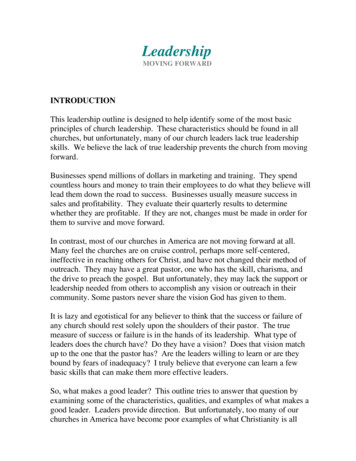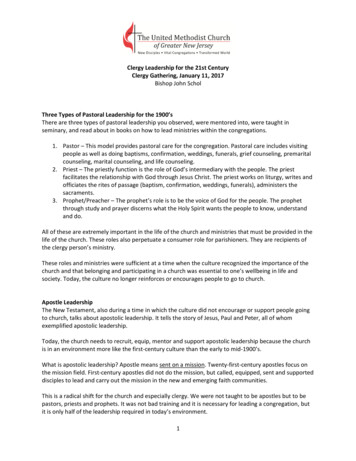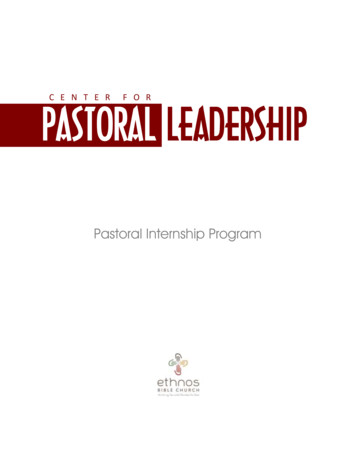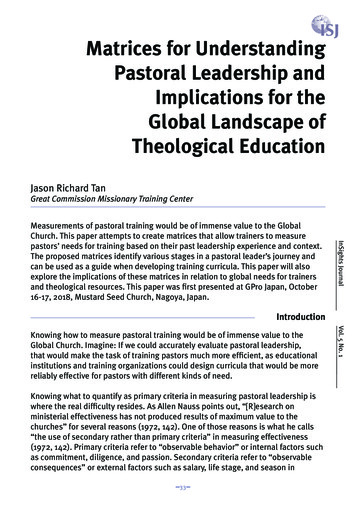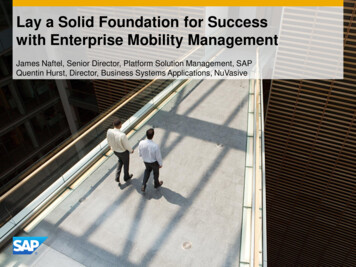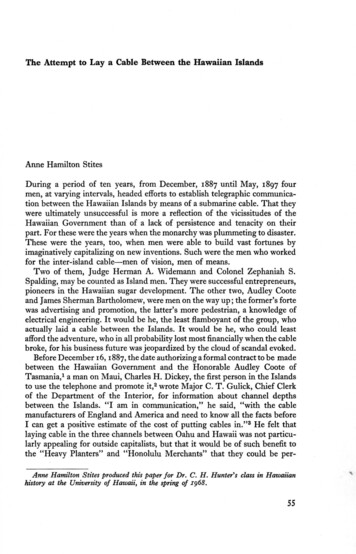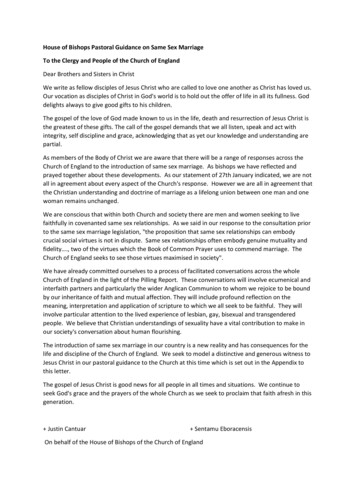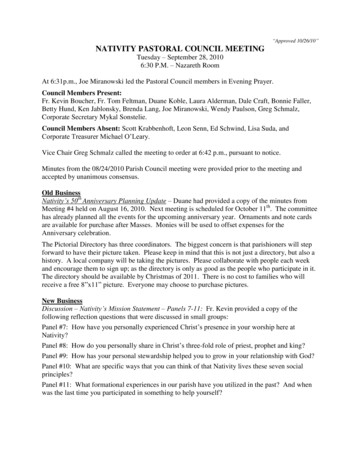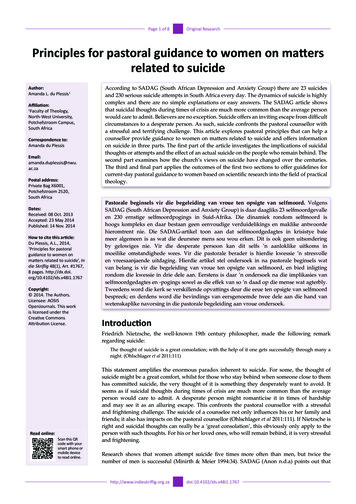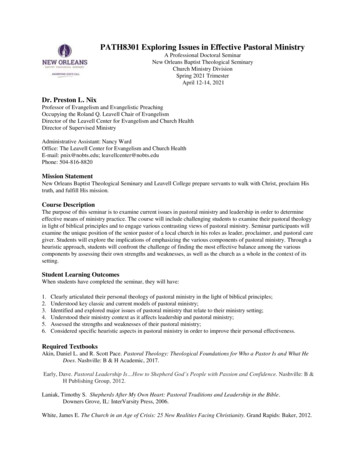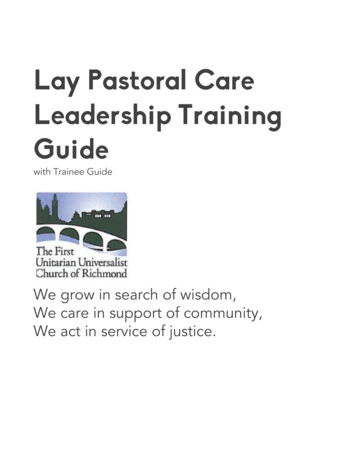
Transcription
Lay Pastoral CareLeadership TrainingGuidewith Trainee GuideWe grow in search of wisdom,We care in support of community,We act in service of justice.
First UU Church of Richmond1000 Blanton AveRichmond, VA 23221Dear Lay Pastoral Care Leader:Welcome to our Lay Pastoral Care training program. We extend to you the care and concern ofthe First Unitarian Universalist Church of Richmond. This training program has evolved with inputfrom a number of Unitarian Universalists.Following the attack on the Pentagon on 9/11, two members of the Unitarian Universalist Churchof Fairfax started a program designed to help the congregants in their church come to termswith the tragedy. Marilyn Renfield, MD and Kathy Birnbaum were brave pioneers who wanted toprovide comfort, hope, and relief to those members of their church suffering from personal lossand pain in their lives. In April of 2003, they trained us at the First UU Church of Richmond whenReverend Enid Virago started our Lay Pastoral Care Program.John and Vicky Griffin were the co-chairs of the program in Richmond. They inspired us to bepart of the research and development of Lay Pastoral Care. In the meantime, Rev. Jeanne Pupkewas serving the Unitarian Church of Portland where a Lay Pastoral Care Program was thriving.She later was called to serve the First UU of Richmond and asked Carol Wayne to chair the LPCAProgram when the Griffins retired. In 2011 Linda Ericson joined the LPCA Team and in 2014 shejoined Carol as co-chair. It is our hope that someday our denomination will develop a curriculumfor Lay Pastoral Care so that any UU congregation will be able to assist their minister(s) andsupport their members.This is your manual; use it as a starting point as you begin the process of training in the LayPastoral Care Program. Add your ideas and help develop something even more effective. Pleasefeel free to email me if you have questions.Sincerely,Carol W. WayneCo-Chairs, Lay Pastoral Care Programpastoralcare@richmonduu.orgpg. 2Linda Ericson
Lay Pastoral Care ProgramTable of ContentsLay Pastoral Care Example Training Schedule 4Definition of the Lay Pastoral Care Program . . 5Definition of the Lay Pastoral Care Associate . 7Listening . .10Companioning . . 13Why Congregants Need to Be Seen . 14Example: Lay Pastoral Care Request Handout . 15How Matches Are Made . . . 16Logistics 17Monthly Training Examples . 19Training Evaluation . . 21Timeline 22Questions for LPCA Orientation .23LPC Example Training Schedule . 24LPCA Application 25LPCA Questionnaire 26Sharing your LPC Program with the Congregation 28Maintaining & Growing your LPCA Program . 29Recognizing the LPCAs . 30pg. 3
Lay Pastoral CareExample Training ScheduleFriday, 6-9 pmHymn #69 “Give Thanks”DinnerChalice Lighting and ReadingWelcomeGetting to Know YouHow Does Your Congregation Care for Your Members?BreakWhat is a Lay Pastoral Care Program?Questions and Wrap-upExtinguish Chalice and ReadingSaturday, 9 am—3 pmBreakfastWorshipWhat is a Lay Pastoral Care Associate?Listening FullyCompanioningBreakBeing a Spiritual PresenceActive ListeningLunchHymn #346 “Come Sing a Song With Me”Practice ListeningWhy do Congregants Need to be Seen?Real Visits, Real DilemmasHow Matches are MadeFrom the Appointment to the Synergy: LogisticsQuestions, Wrap-up, EvaluationExtinguish Chalice and Closing Hymn #298 v. 3 & 5 “Wake, Now, My Senses”PLEASE NOTE: This schedule is intended as an example. Ministers &experienced associates are a good resource for trainers. Werecommend utilizing a minimum of three trainers to deliver atraining session.pg. 4
The Lay Pastoral Care Program is.LPC is a ministerial program to provide a confidential, caring presence tocongregants undergoing stressful life challenges. An extension of the Minister’s own pastoral care presence A group of Lay Pastoral Care Associates (LPCA) recruited by, and reportingdirectly to the minister – a unique ministry independent of the staff andcommittee structure of the church A program visible to, and accessible by the congregationProvides bulletin board Care Request SheetsMaintains LPCA presence at vespers or other worship servicesCreates recognizable name-tags or pins for LPCAInducts and recognizes LPCA at Sunday services A system for continuing LPCA training and feedbackChaired by an experienced LPCA, reporting to the ministerMentored by the ministerStresses strict confidentiality, practiced throughout the programProvides initial, basic training (1-2days)Meets monthly (“Synergy,”) reporting and discussing congregant contacts (12hr)Continues training at each monthly meeting ( 1hr)Provides self-support of members’ own life stressesDiscusses questions arising from congregant contactsQuantifies LPC effort – recording number and length of contacts(typically 1hr/wk; phone, or face-to-face) A means for maintaining a sustained connection between the congregantsand the church, especially when service attendance becomes impractical orimpossible A program that provides a structure for responding to emergencies thataffect the congregationpg. 5
The Lay Pastoral Care Program is not. A program providing practical, logistical service -- the function ofTeam Kindness A “support group” for congregants A source of specific (especially professional) adviceo Legalo Medicalo Financialo Psychologicalpg. 6
The Lay Pastoral Care Associate is.The LPCA is an extension of the Minister. Distinct from other caring members of the congregation Represents the church as the Minister would Is responsible only to the Minister Is an addition to, not a substitute for, the MinisterAn LPCA provides care that is: Sustained. Conducts regular, dependable, progressive meetings andconversations that can continue to explore a line of thought. Trained. Knows how to listen, recognize needs, be sensitive and empathetic,guide or prompt spiritual thinking, and support needs for spiritual practices. Confidential. Accepts secrets, admissions, or other non- public thoughts.The LPCA is: A recorder of life events, attitudes, attributes, desires for end- of-life, andother recollections. A non-judgmental listener for thoughtful discussions, perhaps biased towardbringing forward the values of our faith. Actively focused on the needs of the congregant rather than their personaldilemmas/situations.pg. 7
The Lay Pastoral Care Associate isnot. Practical solver of everyday problems, a “fixer” Chat partner, unless it opens routes to deeper discussions; sometimes, chatmay be the only communication possible Cheerleader, Pollyanna, “yes-man,” absolver Decision-maker Judge, approver Professional counselor (though trained to recognize when such services areneeded) Searcher for own spiritual beliefspg. 8
How Lay Pastoral Care ComparesPsychotherapist/Counselor Treats mental healthconcerns Helps individual tochange feelings,thoughts, andbehaviors Helps individual toease conflicts Needs aprofessional license Providesprofessional mentalhealth counselingpg. 9Lay Pastoral Care Associate Should be trained in lay pastoralcare A ministry of presence Offers to hear congregant’s feelingsand problems Visits with congregant in a neutralsetting, their home, hospital, or asafe and accepting environment Provides space for congregant to talkabout current problems so that agreater understanding may beachieved Refers to professional mental healthworker or one of the church ministersfor counseling or therapy if needed Helps congregant find otherprofessionals as needed Does not need a license and is not atherapist or counselor Is under the auspices of the minister,who meets with the team monthly Associate makes a commitment tobe a supportive presence over anextended time.Team KindnessMember Is not trained in laypastoral care A ministry of action Provides phone callsand cards of care andsympathy tocongregants Sends birthday cards tochurch membersOn short-term basis: Provides meals Helps with shopping Provides transportationto and frommedical/professionalappointments Runs errands Writes notes or letters Makes phone calls Provides child care Pays occasional socialvisits
Listening FullyWhat if you could meet withsomeone who has respect foryour spiritual needs, whocares about your distress,who is a part of your churchWhat if community, and would holdyou could explainyour situation in stricteverything to someoneconfidence?who wants to hear thewhole thing all theway through, the entirerange of your experience,and you could finish yourthoughts withoutinterruption?What if you didn’t have to hear about how soand so handled it such and such away, or get any other well intentioned but sometimes irrelevantadvice?You had compassionate support andthe time to talk completely throughthe issue?pg. 10
The Practice of Active Listening1. Listen to understand what is meant, not to ready yourself to reply, contradict,or refute. This is extremely important as a general attitude.2. Knowing what is meant involves more than the dictionary meanings of wordsused. It involves, among other things, the tone of voice, the facialexpressions, and the overall behavior of the speaker.3. Observe all this and be careful not to interpret too quickly. Look for clues asto what the other person is trying to say, putting yourself (as best you can) inthe speaker’s shoes, seeing the world as the speaker sees it.4. Put aside your own views and opinions for the time being. Realize that youcannot listen to yourself inwardly and at the same time listen outwardly to thespeaker.5. Listening happens faster than talking. Be patient when you are listening.6. The average person speaks about 125 words per minute, but can listen toabout 400 words per minute. The effective listener does not jump ahead ofthe speaker, but gives time to tell the story.7. Do not prepare your answer while you listen. Get the whole message beforedeciding what to say in return. The last sentence of the speaker may give anew slant to what was said before.8. Show interest and alertness. This stimulates the speaker and improvessharing.9. Do not interrupt. When you ask questions, it is to secure more informationnot to trap or force the speaker into a corner.10. Expect the speaker’s language to differ from the way you would say the“same thing” yourself. Do not quibble about words, but try toget at what is meant.pg. 11
Practicing Active Listeningpractice with a partner, sharing about something with deep meaning to you or use these situations belowSituation 1:Jane’s grandmother moved in with her about six months ago because she wassuffering from Alzheimer’s disease and had been living alone. Jane is an only childand is also a single mother of two young children. She can’t afford to put hergrandmother in a home and can only afford part time help for her grandmotherduring the day while she is at work. She works all day as a waitress, and then comeshome to care for her grandmother and two children. The financial strain, emotionalstress, and physical labor are wearing Jane down and she doesn’t know whom toturn to.Situation 2:Scott was driving home late one night from work when he fell asleep at the wheeland hit another car head-on. It left Scott and the other driver hospitalized forweeks. The other driver suffered multiple fractures and had surgery to repair thedamage. Scott also had surgery to fix two shattered legs. This left him disabled andunable to return to work as a contractor. Scott’s wife had to work two jobs tosupport Scott and their three children. Scott has horrible guilt over the accidentand major feelings of inadequacy because he can no longer provide for his family.pg. 12
CompanioningA ministry of presence Put everything aside before you begin visits so you are fully present to yourcongregants Stand WITH your congregants as they struggle with challenges so that theyknow they are not alone Convey unconditional positive regard, empathy, compassion, assurance,affirmation, understanding, and acceptance Talk about the feelings and the process of wrestling with the challenge. Resistthe temptation to fix or cure the problem Assist them in identifying community resources that may be helpful Create a space in which congregants can acknowledge the multiple feelingsthey may have about their issues Don’t rush the process; progress will happen when the time is right Part of being caring is being honest; there may be times when you’ll want toreflect to your congregants your concerns about ideas they may have Be dependable. Keep appointments and confidentialitypg. 13
Why Do Congregants Need to BeSeen by Lay Pastoral Care?Life challenges that leave us feeling very alone and overwhelmed, or demand great contemplation.All congregants experience stress, but prolonged, intense, and/or multiple sourcesof stress may warrant Lay Pastoral Care.These sources of stress may include: The death of a close friend, family member, or caregiver Family member or partner relationship changes (including separation anddivorce) Employment changes (including job loss or work environment adjustment) Serious injury or illness Challenges in building a family (including birth, adoption, miscarriage,pregnancy, and post-partum depression) Changes in household structure such as relatives moving in or out Changes or questioning of gender identity Discrimination and prejudice Threats to security or safety Activism Isolation Imprisonment or jail, and re-entrypg. 14
Presenting Lay Pastoral Careto the Congregation(the text below serves as an example for a website or brochure)Who might want Lay Pastoral Care?Challenges come our way in life. Some are pretty manageable. Others leave usfeeling very alone and overwhelmed, or demand great contemplation.Lay Pastoral Care is available to offer sustained personal support to those enduringgrieving, illness, injury, disability, marital changes, unemployment, relocation, caregiving, isolation, inability to attend church, or other difficult life situations.Our ministers train and commission the Lay Pastoral Care Associates to provide anongoing, caring, listening presence, spiritual support, and hope in times of need.This program is fundamental to our congregation’s mission statement, whichincludes:“We grow in search of Wisdom, we care in support of Community, we act in serviceof Justice.”How can I receive Lay Pastoral Care?Call our ministers at xxx-xxxx or the coordinator of the program, [name] at xxx-xxxx. This service is available to members and friends of the congregation. Thereare no fees. This care is offered with strict confidentiality and under the supervisionof a Minister.pg. 15
How Matches Are Made The Minister and Chairperson meet privately with LPCA trainees to reviewtheir application forms, discuss their interests in depth, and develop a senseof their strengths. The Chairperson also keeps a zip code map of the area with an indication ofthe location of each LPCA. Congregants may contact the Minister or the Chairperson to request LayPastoral Care, or the minister may identify a congregant as needing care. If an LPCA finds out about a congregant needing care from either thecongregant needing help or someone else, it should be discussed with thechairperson. The Chairperson identifies the LPCA best-suited to help the congregantbased on strengths, interests, and location, and proposes the possible matchto the Minister for input. The Chairperson calls the identified associate to explain the circumstancesand be sure the associate can respond by phone within 24 hours. The Chairperson calls the congregant to let them know which LPCA will be incontact. The LPCA calls the congregant within 24 hours and arranges the first visit tobe held within less than one week.pg. 16
Logistics: From the Appointment to theSynergy Meeting1. Maintain confidentiality so that others near you or the congregant during callsor visits will not become aware of the Lay Pastoral Care (LPC) relationship.The only other people who should know are your Minister, church staff whichthe Minister has authorized, and the LPC Chairperson. (The relationship maybe slightly less confidential in the case of dementia.)2. When you are matched with a congregant, call them within 24 hours andschedule the first appointment to be held within a week.3. Give them your phone number and let them know when it’s okay to call.4. Reschedule your appointment if you become sick with anything contagious.5. Meet on neutral ground that provides privacy.6. During the first meeting with the congregant: Explain what Lay Pastoral Care is Explain the confidentiality of the relationship Listen and provide companionship Establish a plan of the frequency and duration of the visits(generally each week for an hour) Schedule the next visit7. After the first visit: Note the data needed for synergy meetings (# of visits, # of hours, etc.) Record the key points discussed with your congregant8. Call the LPC Chairperson if you have questions that must be answered NOWinstead of waiting for the next synergy meeting9. Protect this relationship Focus on listening fully Set boundaries In general, transportation, meals, and similar needs shouldbe met by others in the congregation(cont’d on next page)pg. 17
Logistics: From the Appointment to theSynergy Meeting (cont’d)10. Attend the monthly training and synergy meetings with the other associatesand minister(s):o Give the group a little information about the circumstances for yourcongregant without revealing identifying informationo Ask the group for help if you have questionso Allow the group to offer suggestionso Participate in helping your fellow associates with their congregantso Take notes during training so that you can refer to them later asneeded11. As the congregant begins to come to terms with their challenges, you willsense when it’s time to close the relationshipo Discuss with your congregant and determine their readiness and thebest way to taper visitso Discuss any closure plans at synergy meetingo You may find a deeper connection to your congregant that keeps youin touch long after the supervised LPC relationship has closed—and thisis normalpg. 18
Examples of Topics for Monthly Training pg. 19Entering into discussion on SpiritualityGroup read and discussion of “A Ministry of Presence” by Denis MeachamDementia: Guest speaker from the Alzheimer’s AssociationDeath and dying: anticipating griefHow to be effective at VespersCommunity catastrophe and grievingUse a current event as example in trainingHow to recognize when a congregant needs a referral to a professional:Guest psychiatrist or psychologist as speakerDeath and Dying: Stages of GriefTuning in to disability and accessibilityHow we encounter one another and self careSuggested reading: The Little Book of Spirituality for Atheists, Here If YouNeed Me by Kate Braestern; Difficult Conversations: How to Discuss WhatMatters Most by Douglas StoneResources for aging: Guest speaker from the local Office on AgingAromatherapyDeath and dying: Planning your services and final arrangementsHospice servicesReview of Annual ReportHow to be present with a congregant when active listening is not practical(example follows)Mental illness: Guest speaker from the National Alliance of Mental IllnessResourcesSocial Event – it’s good to devote a meeting each year to social time to buildrelationships with each other
How to Be Present with a CongregantWhen Active Listening is Not Practical(Monthly Training Example)1.Mention that you bring greetings from the congregation2.Read the church newsletter3.Read selections (lyrics, responsive readings) from hymnals4.Play a podcast or recording of Sunday service5.Research congregant’s previous contributions in the congregation to use as a point ofconversation. For example, if congregant was on the Board of Directors, check pastminutes for information about his or her contributions to the church and read thosesections to the congregant6.Bring a chalice to touch, hold, see, and light7.Show photos from daily life in prior decades when congregant was younger8.Bring a fruit or vegetable to see, touch, and eat9.Bring a seasonal nature item to see, touch, hold10. Read to the congregant from his or her library11. Show the congregant photos from his or her photo albums12. Bring something pleasing to touch13. Take congregants around their living quarters so they can give a tour and describe theirbelongings and the stories that go with them. Help them touch items they may notnormally be able to reach14. Bring recordings of UU hymns to hear and sing along with15. Bring in art object for the congregant to see, touch, hold16. Show congregant church membership directory photographs from a range of yearsduring the congregant’s membership17. Your loving, caring presence and tone of voice will be receivedprobably more than you can tellpg. 20
Evaluation of Lay Pastoral Care TrainingTop three helpful sessions and why1.2.3.Least three helpful sessions and why1.2.3.Please provide feedback about the trainersOverall suggestions to improve trainingpg. 21
TimelineIn four months, you can develop a Lay Pastoral Care Program!First MonthMinisterProgram ChairIdentify Program ChairXDiscuss PlansXXIdentify potential Lay Pastoral Care Associates (LPCA)XXCommunicate to congregation that you’re starting a programand invite interested individuals to orientationXXEstablish dates for: orientation, initial training weekend, monthlyon-going training and synergy meetingsXXSecond MonthCall potential LPCA and invite to orientationHold orientationXXDetermine interest in receiving training and invite those personsXXThird MonthPresent the initial Trainee Guide (example, pg. 24)XXReview written information and meet individually with traineesXXDevelop a list of congregants who might want to receive careXXDecide on training topic for first monthly meeting of the groupXXBegin matching congregants with LPCAXXHold your first monthly meeting for on-going training and synergyXXFourth Monthpg. 22
Questions to be answered at the LPCA Orientation:1.What is the purpose of the LPCA Program?2.How does it operate?3.How are LPCAs trained?4.How are LPCAs supported?5.How much time is needed to serve as an LPCA?6.How is it decided who will get a visit?7.What does an LPCA do on a visit?8.Why do the LPCAs meet monthly?9.How are the LPCA meetings structured?10. What happens if LPCAs encounter situations they are unsure about?11. Why did current LPCAs choose to take on this role?12. How can LPCAs assist the church at times of stress?pg. 23
Lay Pastoral Care Example Training ScheduleWe use our minister, Program Chairs, and current LPCAs to provide training.Some topics are more suitable for the minister to present.Friday, 6-9pm6-6:45 pm6:45-6:50 pm6:50-7:05 pm7:05-7:40 pm7:40 – 8 pm8 – 8:10 pm8:10 – 8:30 pm8:30 – 8:55 pm8:55 -9 pmHymn #69 “Give Thanks” and DinnerChalice Lighting and ReadingWelcomeGetting to Know YouHow Does Your Congregation Care for Your Members?BreakWhat is a Lay Pastoral Care Program?Questions and Wrap-UpExtinguish Chalice and ReadingSaturday, 9 am – 3 pm9-9:15 am9:15 – 9:30 am9:30 – 9:50 am9:50 – 10 am10 – 10:20 am10:20 – 10:30 am10:30 – 10:45 am10:45 – 11:45 am11:45 am – 12:30 pm12:30 – 12:35 pm12:35 – 1:30 pm1:30 – 1:40 pm1:40 – 2:05 pm2:05 – 2:15 pm2:15 – 2:25 pm2:25 – 2:50 pm2:50 – 3 pmpg. 24BreakfastWorshipWhat is a Lay Pastoral Care Associate?Listening FullyCompanioningBreakBeing a Spiritual PresenceActive ListeningLunchHymn #346 “Come Sing a Song With Me”Practice ListeningWho Do Congregants Need to Be Seen?Real Visits, Real DilemmasHow Matches are MadeFrom the Appointment to Synergy: LogisticsQuestions, Wrap-Up, EvaluationExtinguish Chalice & Closing Hymn #298 “Wake, Now, My Senses”
Lay Pastoral Care Trainee ApplicationName:DOB:Address:Phone: (c)(w)(h)Employment/Occupation:Year Joined Church:Email Address:Current Other Volunteer Work for Church:Previous Other Volunteer Work for Church:Training or experience in Pastoral Care or Mental Health work:Reasons that you wish to be a Lay Pastoral Care Associate:pg. 25
Lay Pastoral Care Trainee QuestionnaireName:Date:What personal gifts do you believe you have to contribute to this ministry?What is your personal history of both receiving and giving care?In what ways do you care for yourself?What are your concerns or hesitations about serving as a Lay Pastoral Care Associate?Describe your availability to visit with a congregant, including number of hours/week, timesof day or evening, days of the week, and geographic range.Describe any pertinent training or expertise you have which you’d like to share with usduring one of our monthly trainings.pg. 26
Lay Pastoral Care Trainee Questionnaire(cont’d)Name:Date:The following list includes many of the events in life that might lead to congregants seeking Lay PastoralCare. Please indicate for which events you would be comfortable visiting a congregant, and also which eventsyou’d prefer not to visit a congregant. Don’t worry about not being comfortable with every event – weunderstand!Would liketo supportDo not wishto supportThe death of a close friend, family member, or caregiverFamily member or partner relationship changes (includingseparation and divorce)Employment changes (including job loss or work environmentadjustment)Serious injury or illnessChallenges in building a family (including birth, adoption,miscarriage, pregnancy, and post-partum depression)Changes in household structure such as relatives moving in oroutChanges or questioning of gender identityDiscrimination or prejudiceThreats to security or safetyActivismIsolationImprisonment or jail, and re-entryAny additional topics that you wish to support:pg. 27
Sharing Your Lay Pastoral Care Program withthe Congregation- Describe your work at a Sunday Service (work with the minister forconsistency of messaging)- Submit an article to the church newsletter- Create labels for the nametags of the LPCAs- Devote a section of the Sunday service to commissioning the newtrainees and inviting new people to make themselves known toreceive or give care- Describe your work to all church staff, the Board of Directors,committee chairpersons, etc.- Submit a report for the Church Annual Report, including hoursspent giving care, receiving training, numbers of members served,etc.- Set up an informational booth at church during the “activity fairs”or other appropriate timespg. 28
Maintaining and GrowingYour LPCA Program- Request Lay Pastoral Care Associates attend at least eight out of ten trainingand synergy meetings a year, whether or not they are currently seeing acongregant.- Ask for at least a two-year commitment from a Lay Pastoral Care Associate.- Recognize trainees and commission them as associates at a Sunday serviceafter they complete a certain number of monthly trainings.- As needed, develop a new set of trainees for the program. Host an orientation for the potential trainees to meet the current LPCAs,hear an overview of the program, and ask questions. Use current LPCAs to assist during discussions in training and to presentsome of the training topicsoGreat refresher for the LPCA presenting the topic and any LPCAs thathappen to be there to help in generaloStrengthens LPCA commitment to the programoMinister and LPCA Chairperson can see how the LPCA hasunderstood and utilized the training they receivedpg. 29
Recognizing the Lay Pastoral CareAssociatesIt’s important to recognize the impact of the LPCAs work.Our church gave a lapel pin to each LPCA at their commissioningceremonies. The pin is worn during Lay Pastoral Care Visits.What ideas do you have for recognizing your team?pg. 30
Pastoral Care Program. Add your ideas and help develop something even more effective. Please feel free to email me if you have questions. Sincerely, Carol W. Wayne Linda Ericson . Co-Chairs, Lay Pas
